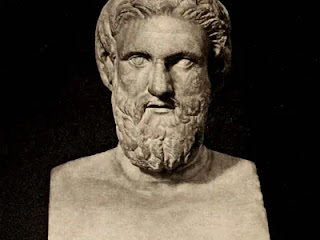Lincoln in 1838 Saw it Coming
In his Lyceum address in 1838,
Abraham Lincoln pointed out that 'the country’s republican experiment, though
successful so far, would always require the people’s vigilant care.' He told his audience that the main threat would not come from a
foreign invader.
'At what point then is the approach of danger to be expected?' the future president rhetorically asked. He went on to answer
his own question by saying 'If destruction be our lot, we must
ourselves be our author and finisher. As a nation of freemen, we must live
through all time, or die by suicide.'
Lincoln feared, quite correctly, a civil war. Today's House Committee's hearings
are providing that 'vigilant care' Lincoln spoke
of, in dealing with the present danger which is coming from within the nation, and not
from elsewhere, presented by the acts of the defeated former president and his
supporters, of which it appears America’s citizenry are both the ‘author and finisher.’ I
hope it finishes well.
JL
* *
* *
To How Many People Have You
Forwarded This Blog?
* * * *
Leave it to the Girls?
Had lunch the other day with a bright couple dating back to my kindergarten days. The subject turned to what women might do to alter the political morass in which the nation seems to be. Before long, we were discussing an old Greek play, Lysistrata.
 |
| Aristophanes |
Nothing has changed much since then, except that women can now vote and hold office! Lysistrata has been produced occasionally on Broadway, as a musical and I am sure some off-B'way producer is working on a revival right now in which this strategy is used to restore the rights taken away by the Dobbs decision, repealing Roe vs. Wade.
I am awaiting the exposure of Aristophanes as an originating member of Antifa by Jim Jordan and Marjorie Taylor Greene and his also being denounced on Fox News, complaining that this 'commie' playwright refused to be interviewed by Tucker Carlson.
* *
* *
To How Many People Have You Forwarded This Blog?
* * * *
A Strategy to Convict
Okay, you’re on a jury, where the
defendant is presumed innocent until you and the other jurors, decide
otherwise. The defendant is the defeated
former president. A credible witness, a
former acting Attorney General, testifies under oath that the defendant asked
him to “Just say the election was corrupt and
leave the rest to me and the Republican congressmen,”
Assuming
these congressmen would do his bidding, the defendant would have indeed committed
a crime, in violation of the Constitution, if the acting Attorney General had
gone along with him. But he didn’t, so this particular plan did not go beyond the
defendant’s mind. Your jury is not going
to convict.
This is just
one example of the difficulty the Department of Justice will have in tying the
many similar incidents of the defendant’s planning to defy the Constitution with
the acts of others actually carrying out those plans. Intent and planning sedition are not the same
as carrying it out. This is the problem
the DOJ faces and they cannot risk losing in Court. They would have a much easier job if the
defeated former president had gone on to the Capitol and raised his fist in
support before the rioters, urging them on, as Missouri Senator *Josh Hawley
did. But he didn’t.
As I see it,
and I am not a lawyer, the only winning approach for the DOJ, if they proceed
to indict, is to cite the many repeated incidents of planning on the part of
the defendant as evidence of his intentions, even though it were others,
getting the message, who attempted to carry out his plans.
The
prosecution must make the point that one or two such incidents might be
acceptable as just ‘planning’ on the part of the defendant. The enormous number
of them, however, all confirmed by reliable witnesses, should be taken together
by a jury as going beyond being mere ‘planning.’ Considering their great number, they should
be taken to amount to a planned 'grand strategy,' the culmination of which on
January 6, 2021, he cannot separate himself from, and convict him.
* Josh Hawley defeated Claire McKissick to get his Senate seat in 2018 by a margin of 51.4% to 45.6% (3% went to minor candidates) which points up the fact that the defeated former president is not the problem so much as his misinformed and misguided voters are. Even if he were not available to run, they would find someone else to support, someone who also did not understand nor believe in democracy.
JL
* * * *
To How Many People Have You
Forwarded This Blog?
* * * *
Depression
Should Lead to Awareness and Ultimately, Action
A follower of the blog texted me saying that the last posting
depressed her. Here is what I said to
her in response.
‘Depression is good! That should be motivation to do something about it. Start with reading Timothy Snyder's very short book, 'On Tyranny.' You may be depressed, but you are at least 'aware.' Tyranny slips in quietly, with the people sometimes unaware.
A short story. It's true. A Holocaust survivor who
belonged to my shul on Long Island was still living in Germany when
Kristallnacht occurred. His father had a furniture store, which was broken into
and had its windows smashed. What did he do? He picked up the phone and
called the police about the vandalism. Of course, they laughed at him and
hung up.
By 1938, living in Germany, he should have been
aware of what was going on but he was not, shown by the fact that he actually
expected help from the police. Maybe, if more had been aware, and as a
result, became depressed, they would have been moved to try to leave
in time to save their lives. We cannot
ignore the torch-bearing marchers in Charlottesville and what
they were shouting, the shootings at the synagogues in Pittsburgh and
Poway, CA, and the Capitol invader with the 'Camp Auschwitz' tee
shirt.
These things are not to be taken 'in stride.'
They should create awareness. In my blog, I say that, eventually, things
will get better. But first, they have to get bad enough to make enough
people 'aware,' even if some depression is involved.’
JL
* *
* *
To How Many
People Have You Forwarded This Blog?
* * * *
Everybody Loves Madison Who Walked on Both
Sides of the Street
It seems that Republicans have embraced the
idea that state legislatures should dominate our political system. That lead me to embark upon a re-reading of
James Madison in Federalist Paper Number 39, the last paragraph of which I
quote below.
By using the term 'federal,' Madison refers to
powers of those individual states, especially their legislatures and by
'national.' he means the powers of the central government. The Constitution.
intentionally a bundle of the compromises needed to ensure its ratification was therefore confusing in 1789 and the one thing that is clear today is that
it remains so. If you have an hour or so to spare, try to read #39 in its entirety.
I'm sure you can find it online somewhere.
Here’s that excerpt:
'The proposed Constitution, therefore, is, in
strictness, neither a national nor a federal Constitution., but a composition
of both. In its foundation it is federal, not national; in the sources from
which the ordinary powers of the government are drawn, it is partly federal and
partly national; in the operation of these powers, it is national not federal;
in the extent of them, again, it is federal, not national; finally, in the
authoritative mode of introducing amendments, it is neither wholly federal nor
wholly national.'
After digesting this gibberish, I can see that
Madison was honest in Number 39 in pointing out that the powers of government
came from ‘the great body of the people,’ a democratic idea. He also was honest in pointing out that most
of them, however, came indirectly, through their voting being limited to state
legislatures and members of just one house of Congress. This was a republican idea. But either way, the powers of government came
from the 'great body of the people' and not an autocratic leader or aristocratic
group. They just took longer to get where they were going via the republican route. Hence, Madison
catered to both sides and all were satisfied, at least openly, with our
‘democratic republic.’
Of course, some today, as then, would prefer
that the preferences of ‘the great body of the people’ be achieved either through
more democratic (or national, giving more influence to central govenment) means and others through more republican
(or federal, a word derived from 'confederation,' giving more power to the states) means. Hence we have Democrats
and Republicans, both claiming Madison as their own.
* *
* *
To How Many People
Have You Forwarded This Blog?
* * * *
America
Afloat
Jack Lippman
The greatness of America
Is
that it does survive
Attacks
upon democracy
Whose
flame it keeps alive.
The
laws that blossom from the words
The
Founding Fathers wrote
Still
serve us well today to keep
America
afloat.
This
doesn’t happen by itself,
We
cannot wish it true,
The
bottom line, my friends, is that
It
all depends on you.
JL
* *
* *
To How Many People Have You Forwarded This Blog?
* * * *
That’s Not Enough!



No comments:
Post a Comment